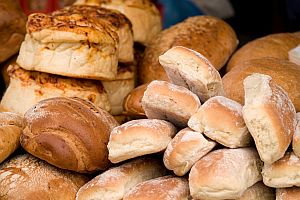Unrealistic Expectations for Gluten-Free Diets?
 It is official: the gluten-free diet is the latest “magic bullet” weight-loss craze. Seeing shelf after shelf filled with gluten-free foods in grocery stores is becoming the new norm, which is great news for the relatively small number of people who truly suffer from gluten-intolerance (aka celiac disease). But gluten-free has become something much larger—the nation’s newest weight-loss love affair. However, evidence suggests that a gluten-free diet by itself is largely useless if you’re trying to lose weight. So, this begs the question—do Americans now have unrealistic expectations when it comes to living gluten-free?
It is official: the gluten-free diet is the latest “magic bullet” weight-loss craze. Seeing shelf after shelf filled with gluten-free foods in grocery stores is becoming the new norm, which is great news for the relatively small number of people who truly suffer from gluten-intolerance (aka celiac disease). But gluten-free has become something much larger—the nation’s newest weight-loss love affair. However, evidence suggests that a gluten-free diet by itself is largely useless if you’re trying to lose weight. So, this begs the question—do Americans now have unrealistic expectations when it comes to living gluten-free?
In a word, yes. According to the Wall Street Journal, about a third of the American populace is avoiding gluten, a protein that is responsible for the elastic texture of dough that is often found in grains such as wheat. While about 1% of the population suffers from celiac disease, sales of foods labelled “gluten-free” have exploded and are now worth an estimated $23 billion per year. Many people take up this diet with expectations of losing weight—but they may find themselves disappointed.
As US Newsreports, “But there’s no hard evidence that a gluten-free diet is appropriate for weight loss or is any more effective at whittling waistlines than other diet plans. Most experts recommend it only for those with celiac disease or gluten intolerance, says David Katz, founding director of the Yale-Griffin Prevention Research Center.”
However, the article goes on to say, “Still, cutting out gluten can lead to weight loss, since the plan forces dieters to shun high-calorie refined carbohydrates. ‘Tell anyone to cut down on bread and pasta, and they’re likely going to drop calories and lose weight,’ Politi [Elisabetta Politi, nutrition director at the Duke Diet and Fitness Center in Durham, N.C]says. But gluten-free is no weight-loss panacea, either. ‘If you’re going down the grocery aisle grabbing gluten-free cookies and pasta and bread, you probably won’t be as successful.’ A gluten-free brownie is still a brownie. Often, these products are packed with saturated fat, cholesterol, and sugar to improve taste.”
Not only are many gluten-free products packed with unhealthful ingredients, they are often more expensive than their gluten-containing counterparts—sometimes much more. This puts the gluten-free diet in the same category as other expensive fad diets that have given false hope to their followers. Instead, nutritionists agree, it is far better to live on a low-sugar diet that’s packed with fresh fruits and vegetables, whole grains, lean meat, and low-fat dairy.
As WebMD puts it, “Gluten itself doesn’t offer special nutritional benefits. But the many whole grains that contain gluten do. They’re rich in an array of vitamins and minerals, such as B vitamins and iron, as well as fiber. Studies show that whole grain foods, as part of a healthy diet, may help lower risk of heart disease, type-2 diabetes, and some forms of cancer. The 2010 Dietary Guidelines for Americans recommends that half of all carbohydrates in the diet come from whole grain products.”
So unless you suffer from celiac disease or non-celiac gluten sensitivity, you may consider saving your money and lowering your expectations for gluten-free. It’s been said before and it’ll be said again: there is no magic weight-loss bullet—at least not yet—and if you truly want to live a healthy lifestyle, proper diet and exercise is still the best way to go.